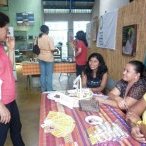English · Español

1 September 2011 | Interviews | Food Sovereignty
Another Economy is Possible
Costa Rica: peasants and indigenous people propose solidarity economy
Download: MP3 (2.1 Mb)
A new edition of the Bajo la Ceiba meeting took place on August 26th, in La Troja Ecologista, in San Jose, capital city of the country. This event promotes the proposal of solidarity trade. Over 15 social groups invited by COECOCEIBA Friends of the Earth Costa Rica and COKOMAL participated in the discussions.
La Troja Ecologista is a project by COECOCEIBA created in 2010, a space located in downtown San Jose, focused on the commercialization and distribution of peasant and indigenous healthy food from a solidarity economy perspective, in favor of a more just society, criticizing free trade.
According to COECOCEIBA and COKOMAL, the Bajo la Ceiba Meeting aims not only to improve the relationship between producers and consumers, but to generate new resistance spaces against free market. The projects and activities defended by solidarity trade claim an ethical-political position that coincides with the peasant flag of food sovereignty and what the peoples call “well living”.
Real World Radio’s correspondent in Costa Rica, Henry Picado, member of COECOCEIBA, was present at the meeting, whose goal was also to strengthen the network of farmers and indigenous people that are part of the La Troja Ecologista project. The food sold there have a common element: they were locally produced, for the defense of food sovereignty and community rights.
These ideals are promoted, for instance, by indigenous leader Enrique Rivera, from the Térraba people, a producer of artisanal jams. The leader is also part of the resistance against the El Diquís hydroelectric project, in Buenos Aires municipality, Puntarenas province, directed by the Costa Rican Electricity Institute that aims to flood 10 per cent of an indigenous territory.
Rivera believes that solidarity economy links the processes of defense of communities with production activities, to achieve“well-living”. “While the proposal by the government is to exploit rivers, ours is clearly linked to a solidarity agriculture and economy”, said the indigenous leader to Real World Radio.
Another key issue discussed at the Bajo la Ceiba Meeting is related to the gender perspective that is shared by many of the proposals of sustainable project and solidarity trade. Orfa Condega, from the Network of Rural Women, made reference to this issue. She explained to Real World Radio that in the food production paradigm controlled by free trade, the work of women in the countryside becomes invisible.
Solidarity trade is very important, said Orfa, since the production of rice and beans provides more than economic profits, because this food is the center of food sovereignty and the nutrition of peasant families.
Photo: COECOCEIBA Friends of the Earth Costa Rica.







